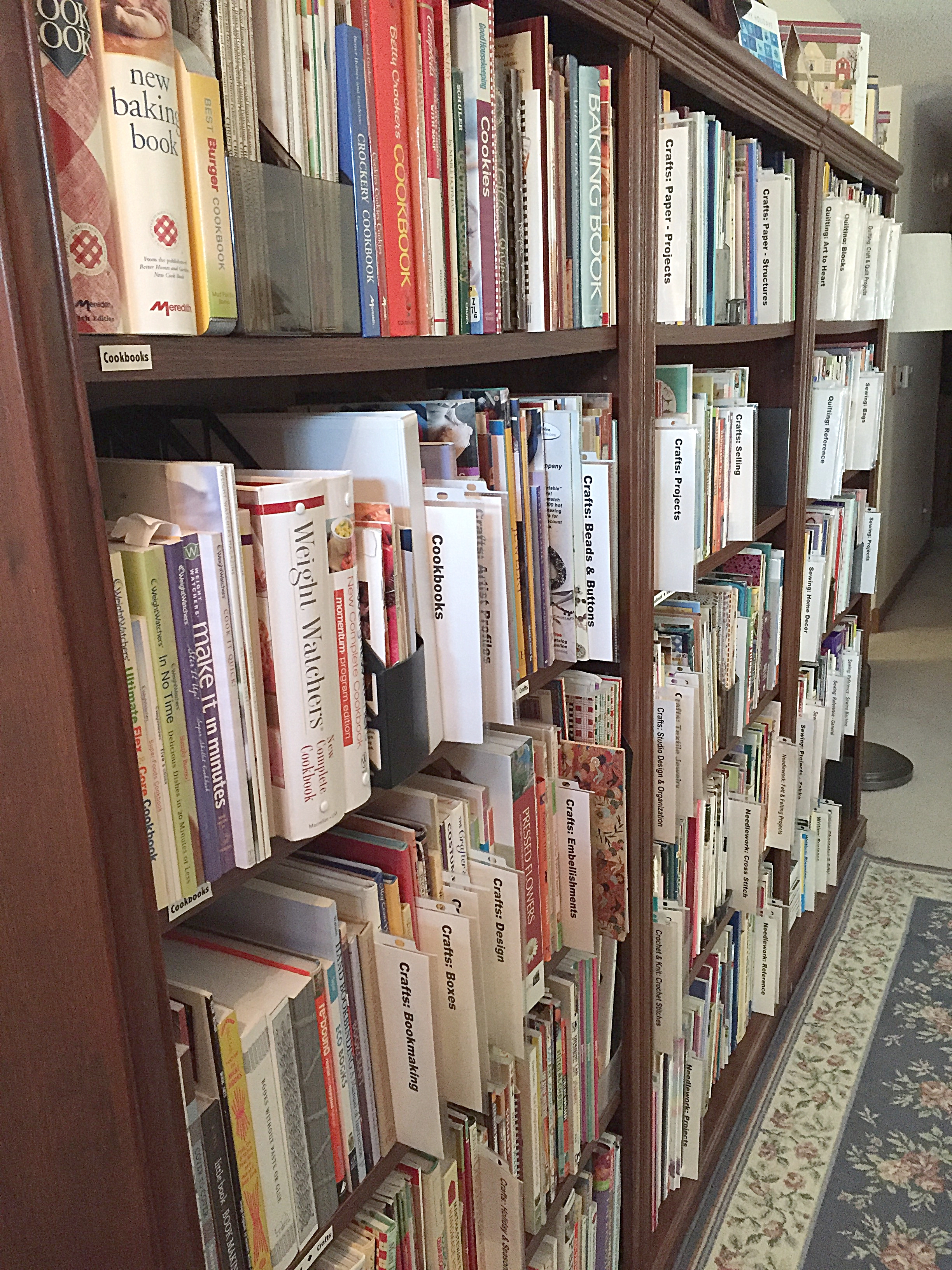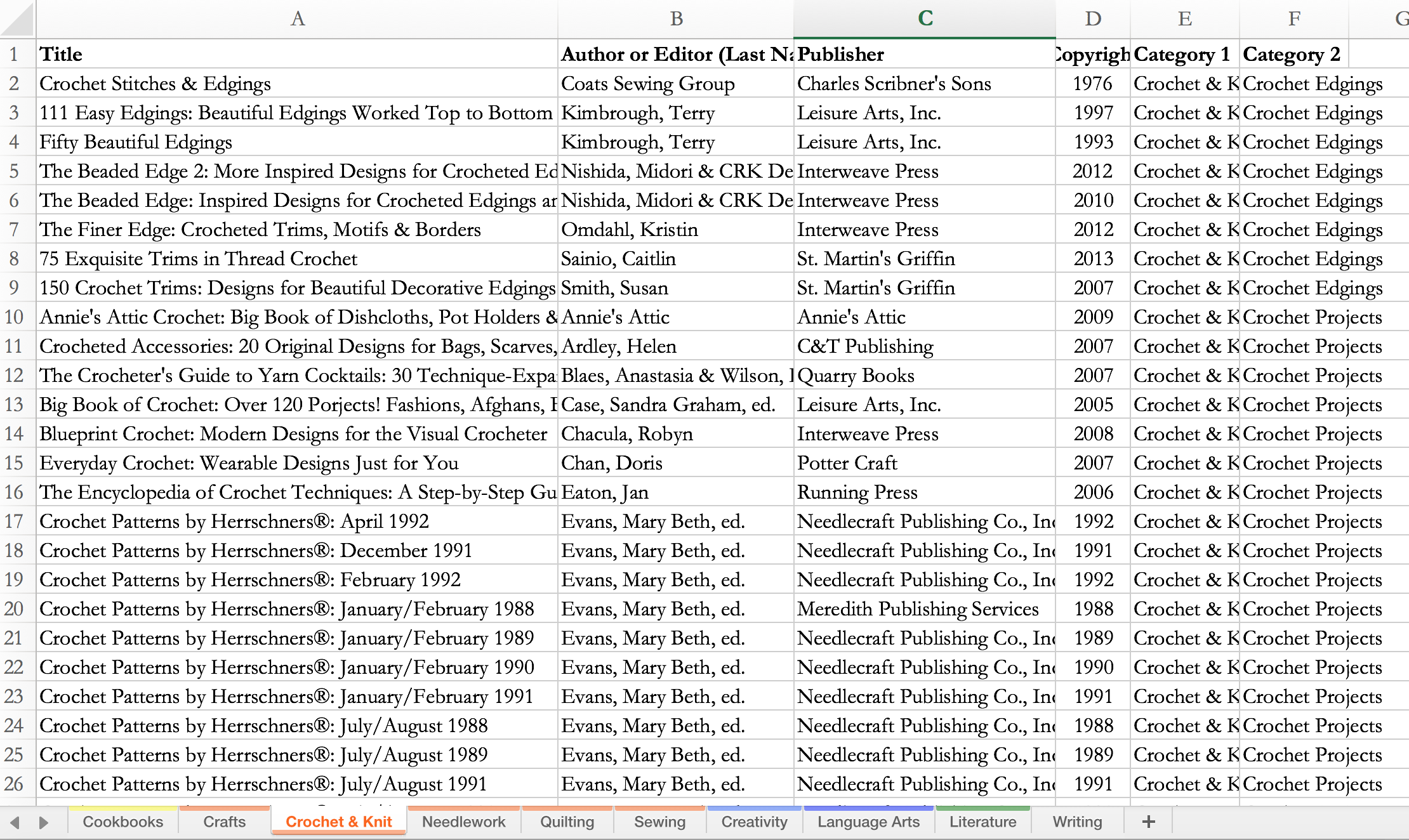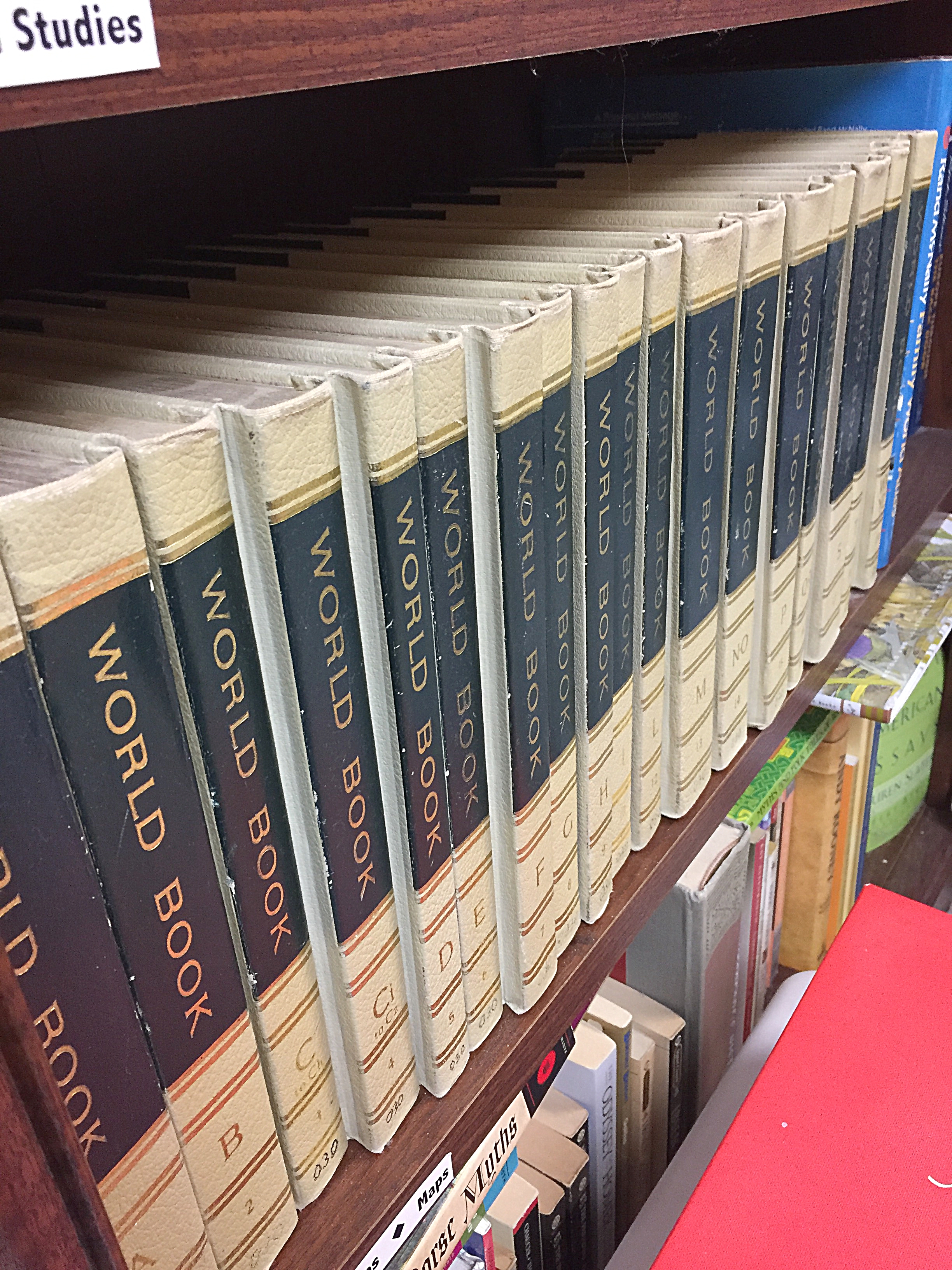I’ve concluded that librarians, or at the very least, library clerks, are athletes in disguise. This weekend, as I was organizing my craft, needlework and sewing books, I rediscovered muscles I didn’t know I owned. Stacks of books moved from the floor to a bookcase, from the bottom shelf of one bookcase to the top shelf of an adjacent bookcase, and from left to right on one shelf after another. Needless to say, I knelt, stretched, stooped and lifted countless times. After swallowing some water and two Advil tablets, I promised myself once again not to let too many books collect in impressive stacks on the floor—or on any available horizontal surface—before returning them to their proper space on the bookshelf. Unfortunately, this is a promise I keep making and breaking. All I can say with certainty is that it’s a lot of work keeping a home library organized that probably rivals the collection at my local library.

As you look at the photo above, you may notice what appear to be dividers peeking out between groups of books. I got the idea at my local library, when I noticed they used plastic labeled dividers to subdivide some categories of books, making them easier to locate. I love this system. I labeled 8-1/2 x 11 sheets of white card stock and inserted them in clear sheet protectors, and it works great. No, I don’t use a Dewey Decimal system, although I seriously considered it at one point. Upon further consideration and the plea of “No, please don’t do that†from my husband, I came up with an alternate system that works for me. If you, too, are overwhelmed by the books in your collection, here are a few tips that may make your life easier.
Use a database
It isn’t enough, if you have a large collection of books, to keep them organized on shelves. Keep a list, whether you use a program like Microsoft Excel or iWork Numbers, or catalog your books using Library Thing or Goodreads.
For myself, I find it convenient to use an Excel workbook. This helps me track the books I own, and to some extent helps prevent me from purchasing duplicate titles if I remember to check my workbook before I go shopping. (This is a key point.) It also is a great way to determine actual book placement on my shelves. Within the workbook, individual worksheets are dedicated to each type of book. One of the columns contains an identifier that represents a subcategory, and these subcategories directly relate to the shelf dividers I use.
For each book, I enter the book’s title, author or editor, publisher, copyright date, main category, and subcategory. It sounds like a lot of work, I know, but you can enter a surprising amount of information while you enjoy a hot chocolate. What’s nice, too, is that you can sort this information according to your needs. I also find that it’s a good way to weed out outdated titles, especially when you take a good, hard look at some of the copyright dates.

Recycle magazines
Many craft magazines cost as much as the books you buy, and thus deserve a neat method of storage for the time you keep them. I don’t keep my magazines forever, mind you. I keep about two years’ worth of magazines, then remove the articles I find especially useful by slicing them out and scanning them. These digitized copies are, of course, for my personal use, and never get shared. I keep some of the illustrations to make bookmarks or gift tags that become giveaways. Then I put what’s left of the magazines in a recycle bin, and that’s the end of that. Some magazines do get passed on to other people or organizations for their enjoyment. But while I am storing the magazines, I keep them in magazine racks you can purchase from your local office supply store.

Cull the herd
As a writer, bookaholic, avid reader, and—yes, I admit it—once upon a time English major, I know how hard it is to get rid of books. But if you don’t, you simply won’t have space for new ones. We don’t want that to happen, do we? Your home is only so large. I have 14 bookcases that stand six feet tall—many more shelves of space than the average person, I know—but I continually run out of book space. And some of those bookcases are used not for books, but for craft supplies. These days, I don’t add many hardcover fiction books to my shelves, unless they are part of a series I have already begun in that fashion, or if they are such long novels that I have to page back to earlier chapters to look up some details. The rest of my new fiction novels are in digital form. I save a lot of bookshelf space by utilizing book apps on both my iPhone and iPad—among them iBooks, Nook, Kindle, Kobo, Free Books by Digital Press Publishing, and Bluefire Reader.

You can donate books to your local library, which will often sell them and use the monies to purchase new books. You can also donate books to senior communities, nursing homes, schools and thrift stores. You can sell some books to a bookstore—I use Half Price books, for example—or you can sell books on Amazon. You can exchange your read books for new titles via a book swap service—I use Paperback Swap, for instance.
Say goodbye to old encyclopedias
I finally thought with my head more than my heart, and decided to get rid of a set of World Book encyclopedias dating back to 1969. The white leather-bound, gold-edged volumes have long held a special place in my heart and on my shelves because I won them during junior high when I sent in a question to the “Ask Andy†column in the Milwaukee Journal. At that time school children were routinely invited to send in their seriously considered questions. Each week one question would be selected and answered by “Andy,†and the student received a complete set of “Aristocrat†World Book encyclopedias. I asked what the real job of a nurse was—a career I considered at one point but decided against. My question was selected, and I received a set of encyclopedias. It was a great prize, but in 2016 these encyclopedias are seriously outdated. Anything I want to know of a general nature can be found online in spades. Time to donate! The space I recover will be used for my books about writing, to which I refer far more often than the World Book encyclopedias that are moving on.

Leave room for expansion
I cannot state strongly enough how important it is to leave breathing room on your shelves for new books. If you’ve ever looked at home decorating magazines, you’ll notice that expansion space is provided with decorative bookends, vases, knickknacks and photo frames. That being said, I have no room for anything but books on my shelves. I love the decorator look, but need to think about functionality more than home dec because of the sheer volume of books I own. I do, however, take care not to squeeze books in so tightly that you can’t add a few new ones. If your cuticles begin bleeding when you insert or remove books, that’s a sure sign you’ve squeezed in too many titles.
Locate sturdy shelves
Locate the sturdiest shelves you can find, or make them yourself. A poorly made bookcase typically has shelves that bow as you add books. Ideally, bookshelves should measure at least one inch thick. Bookcases don’t have to be expensive, but they do have to be strong. If you’re fortunate enough to live near an IKEA store, you can purchase a set of sturdy, functional shelves you can assemble yourself. I don’t live near an IKEA store, so I ordered bookcases through my office supply store’s catalog service. They shipped the shelves directly to my home, and my husband assembled them.
If you have additional suggestions for organizing your home library, I’d love to hear them. Meanwhile, I will return to my own library and finish organizing its contents.
Full disclosure: Yes, I have worked in a library, and I seriously considered going into library science.
© 2016 Judy Nolan. All rights reserved.

I like the divider idea! At some point earlier this year my sister’s boyfriend was trying to organize my mom’s library. I’m actually not sure if the project is finished yet! I agree that getting rid of books is very difficult, but cheap paperbacks don’t hold up well. I try to avoid purchasing paperbacks now, unless I see a good bargain on a used book, and opt for my Kindle, instead.
I can’t get over the size of your library! Fourteen bookcases! Whoa! Good thing you are so organized!
Love your super organized home library! A few weeks ago I sorted through our books to donate and have managed to clear a section of our bookcase. Hopefully I’ll be able to re-organize it in the coming year 🙂
How ironic that a few days ago I was checking my very crowded and disarrayed bookshelves in my room. At once time I had everything organized.
Many of the shelves are filled with things I had no where else to put; children’s stuffed animals, very old Video Tapes (probably none of which are any good) – Thought I could use all that space for my yarns. As I started to go through everything, I had that moment of “mommy memories” – so for now nothing has moved. Your article gave me the incentive to try again!!!
As a very avid reader – and each book has a piece of me attached to them – I cannot part with them – so like you, I need to organize them, and preserve many of them!
Thanks for a great article!